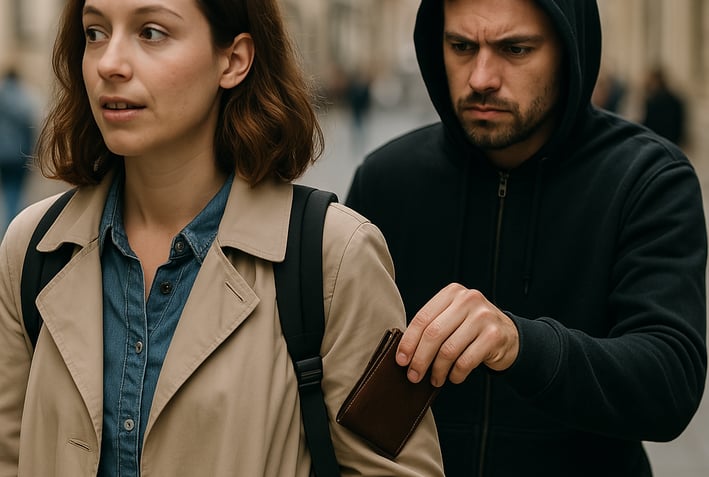Traveling Overseas? Here’s How to Stay Safe Every Step of the Way
From packing to passport control — your complete safety guide for every mile abroad.
smartbudgettravel.com
4/5/20256 min read


Traveling to another country can be one of life’s most rewarding experiences. It opens doors to new cultures, foods, landscapes, and people. But when you're far from home, staying safe becomes more important than ever. Whether you’re a first-time traveler or a seasoned globetrotter, having a clear safety plan helps you focus on enjoying the journey instead of worrying about what could go wrong. This guide will walk you through everything you need to know about staying safe during every stage of your overseas adventure — from preparation to arrival, and all the way through your return.
Before You Go: Laying the Groundwork for a Safe Trip
1. Research Your Destination Thoroughly
Start by learning as much as you can about your destination. Look into the local customs, laws, weather patterns, and political situation. Some countries have regions that are less safe than others, even if the rest of the country is generally secure.
You don’t have to deep-dive like a historian, but a few hours of reading travel forums, local news, and travel advisories from reputable sources can go a long way. Understanding local etiquette can also help you avoid offending anyone or attracting unwanted attention.
2. Share Your Itinerary
Before you head out, share your full itinerary with a close family member or friend. Include your flight details, hotel addresses, and emergency contact numbers. It’s a simple step that ensures someone knows where you are in case of any issues.
Also, consider enabling location sharing on your phone with a trusted contact. You don’t need to broadcast your whereabouts to the world but having someone who can track your location in real time offers an added layer of safety.
3. Make Digital and Physical Copies of Important Documents
Losing your passport or ID abroad can be a nightmare. Always carry your original documents in a safe place (like a money belt or inside zippered pocket), but also keep digital copies stored securely in the cloud. Print out physical copies and place them in different bags — just in case.
Include your passport, visa (if applicable), travel insurance, accommodation confirmations, and any emergency contacts. Having backup documentation makes it easier to get replacements or seek help from your embassy if needed.
4. Get the Right Vaccinations and Medications
Depending on where you’re going, you might need specific vaccinations or medications to protect against illnesses like yellow fever, malaria, or hepatitis. Some countries even require proof of vaccination before you can enter.
Check with your doctor at least a month before your trip. Also, make sure you have enough prescription medication for your entire stay, and carry them in their original containers along with a doctor’s note if needed.
In Transit: Staying Smart While Getting There
5. Keep Your Belongings Close
Airports, train stations, and bus terminals are hotspots for petty theft. Never leave your bags unattended, and avoid displaying expensive items like jewelry, electronics, or large amounts of cash.
If you're carrying a backpack, consider wearing it on your front when in crowded areas. Use locks on your luggage and keep valuables in a separate, hidden pouch or money belt.
6. Be Cautious with Public Wi-Fi
While free Wi-Fi is convenient, public networks are not secure. Hackers can easily access your data if you’re not careful. Avoid logging into your bank account or entering personal information while connected to open networks.
Consider using a virtual private network (VPN) to protect your internet activity. It creates a secure connection and helps keep your data private, especially when booking accommodation or accessing sensitive info on the go.
7. Trust Your Instincts
Even if you’re jet-lagged or navigating a new language, trust your gut. If something feels off — a taxi driver acting strange, a pushy vendor, or a dark alley that doesn’t seem right — remove yourself from the situation. It’s always better to appear overly cautious than to take unnecessary risks.
On the Ground: Staying Safe in a Foreign Country
8. Blend In With Locals
You don’t need to go undercover, but the more you can blend in, the less likely you are to be targeted. Dress modestly and respect local clothing norms. Flashy outfits, expensive accessories, and branded luggage can make you a target for thieves.
Also, observe how locals behave in public. If everyone is speaking quietly and being reserved, it’s probably a good idea not to stand out with loud conversations or flashy behavior.
9. Know the Local Emergency Numbers
Every country has its own version of 911. Make sure you know the emergency numbers for police, fire, and medical help wherever you’re visiting. Store them in your phone and also write them down somewhere safe.
You should also know where your country's embassy or consulate is located, especially in countries where political unrest or natural disasters are more common.
10. Avoid Scams and Tourist Traps
Scams come in all shapes and sizes — fake taxi meters, pickpocketing teams, overcharging street vendors, and more. Some scammers pose as friendly locals offering help, while others may try to distract you while their accomplice grabs your bag.
The best way to avoid scams is by staying aware of your surroundings and being skeptical of offers that seem too good to be true. Do a bit of research beforehand to understand the most common scams in the area you're visiting.
Staying Healthy While Traveling
11. Be Mindful of What You Eat and Drink
Trying new food is one of the best parts of traveling — but you’ll want to do it safely. In some countries, tap water isn’t safe to drink. Stick to bottled or filtered water, and avoid drinks with ice if you're unsure of its source.
When it comes to food, look for places that are busy with locals. High turnover usually means fresh ingredients. Be wary of undercooked meats and unwashed produce. And always carry a few stomach-friendly medications just in case something doesn’t sit right.
12. Protect Yourself from the Elements
Different destinations bring different health challenges. In tropical climates, heat exhaustion and sunburn can creep up quickly. In cold regions, frostbite and hypothermia are real risks. Always pack weather-appropriate clothing and sun protection.
If you’re going hiking or adventuring, make sure you have the right gear. And no matter where you’re headed, stay hydrated and don’t push your limits.
Social Situations and Cultural Awareness
13. Learn a Few Local Phrases
You don’t need to be fluent, but learning how to say “hello,” “please,” “thank you,” and “help” in the local language can go a long way. Locals appreciate the effort, and it can also help you get assistance faster in an emergency.
Having a translation app or phrasebook on hand is a smart move, especially if you get lost or need directions.
14. Respect Local Customs and Laws
Every country has its own rules, and what might be harmless at home could get you in trouble abroad. For example, chewing gum is banned in Singapore, and public displays of affection may be frowned upon or even illegal in some conservative countries.
Before traveling, check for any cultural norms, dress codes, or laws that are significantly different from what you’re used to. A little preparation can help you avoid offending others or attracting unwanted attention.
Technology and Safety Tools
15. Use Safety Apps
There are plenty of apps designed to keep travelers safe. Some let you send your location to friends, find emergency services nearby, or even access local safety tips in real-time.
Look into apps like:
Smart Traveler (by the U.S. State Department)
GeoSure (provides neighborhood safety scores)
Sitata (tracks health and safety alerts worldwide)
Having these tools ready before you travel can help you make quick, informed decisions when needed.
16. Stay Connected
Try to get a local SIM card or international phone plan so you’re always reachable. Having access to maps, translation tools, and communication apps can make your trip smoother and safer.
If you’re traveling alone, send daily check-ins to someone back home. Just a quick text or photo update can offer peace of mind to your loved ones.
Financial Safety and Preparedness
17. Don’t Keep All Your Money in One Place
It’s never a good idea to carry all your cash and cards together. Split them up — keep some in your wallet, a bit in a money belt, and maybe a backup card hidden in your luggage.
Also, alert your bank that you’re traveling. Otherwise, foreign charges might be flagged as suspicious and freeze your account at the worst time.
18. Know How to Access Emergency Funds
Things happen — wallets get lost, cards get declined, or unexpected expenses come up. Make sure you have a way to access emergency money. Some travelers carry a couple hundred dollars in U.S. cash as a backup since it’s widely accepted or exchangeable.
You might also consider a backup credit card or a travel money card for added security.
Returning Home Safely
19. Stay Alert Until You're Home
It’s easy to let your guard down once your plane lands, but you’re not home just yet. Watch your luggage, avoid unlicensed taxis, and don’t post your full trip online until you’re safely back.
This is also a good time to check your bank accounts for any suspicious charges and cancel any temporary travel services you subscribed to.
20. Reflect and Share What You Learned
Once you’re home safe and sound, take some time to reflect on your experience. What went well? What could you do differently next time?
Share your stories and tips with others. Your insights might help someone else travel more safely in the future.
Final Thoughts
Traveling overseas doesn’t have to be risky — but it does require awareness, preparation, and a little common sense. Most people you meet will be friendly and welcoming, and your trip will likely go off without a hitch. But having a plan, staying alert, and trusting your instincts can help you avoid trouble and enjoy every part of your adventure with confidence.
So go ahead — book that ticket, pack your bags, and explore the world. Just don’t forget to stay safe, every step of the way.
Explore Your World Today
Your gateway to unforgettable travel experiences awaits.
info@smartbudgettravel.com
smartbudgettravel.com© 2025. All rights reserved.
